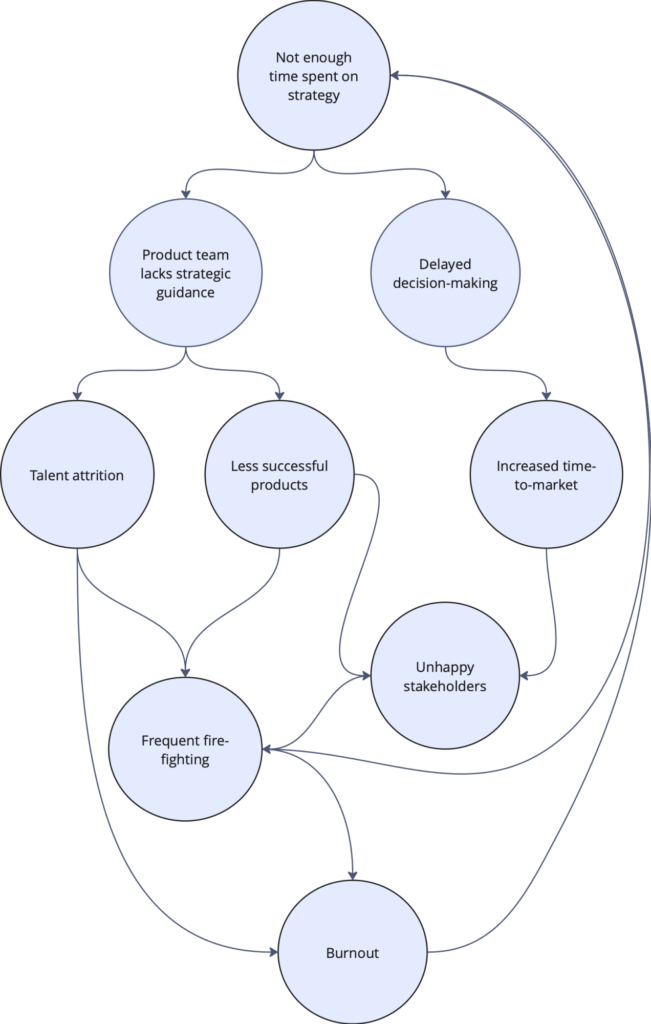As a senior product professional, imagine a workweek focused on strategy—crafting vision, driving innovation, and empowering your team. Instead, you’re stuck in meeting prep, project tracking, and putting out fires. Sound familiar? You’re not alone. The good news? Breaking free from operational chaos starts with rethinking how you manage your workload.
The struggle for strategic focus
Take a moment to reflect on your typical workweek. Do you start with ambitious plans to dedicate time to strategic initiatives, only to watch those plans dissolve as you're pulled into a whirlwind of meetings, emails, and operational tasks? By Friday, you're drained and frustrated, wondering where the week went.
If this sounds familiar, you’re in good company. A 2019 survey by the Pragmatic Institute revealed that while product professionals believe they should spend 56%–60% of their time on strategic activities, the reality is starkly different. Most product professionals find themselves dedicating only 27% of their time to strategy, with the remaining 73% consumed by operational work.
The negative feedback loop of operational overload
While operational work is essential for keeping everything running smoothly day-to-day, if you’re not careful, it can hijack your entire week, leaving you with little to no time for strategic thinking. According to the same 2019 survey, product professionals spend on average 124 hours a month on operational activities.
Spending too much time on operational tasks often creates a vicious cycle, making it even harder to refocus on strategic priorities. Without clear strategic guidance, product teams struggle with decision-making and achieving objectives, leading to delays and poor outcomes. Frustrated stakeholders demand more of your time to manage complaints and firefight. Over time, this cycle drains both you and your team, increasing the risk of burnout.

Once you are stuck in the negative feedback loop of operational overload, it becomes even harder to refocus on strategic activities.
Telltale signs you’re stuck in the loop
If you suspect you might be stuck in the loop of operational overload, ask yourself whether any of the following apply:
1. Your product team lacks proper guidance
Struggles with decision-making and prioritization often stem from unclear vision and strategic direction. Without well-defined goals, everything feels urgent, leading to wasted time and missed opportunities.
2. Your products are missing key objectives or deadlines
Frequent delays or missed deadlines suggest insufficient strategic focus. Reactive planning slows decision-making, hinders execution, and extends time-to-market.
3. You’re spending more time managing stakeholder dissatisfaction
Missed objectives erode trust. Frustrated stakeholders demand more of your attention to address complaints, pulling you further into a reactive cycle.
4. You find yourself constantly firefighting
Short-term problem-solving consumes energy and leaves little room for innovation or growth.
5. Team attrition and burnout
Overworking yourself often means overworking your team. Low morale and high turnover are common in environments overwhelmed by operational overload.
Breaking free from the loop
While operational activities are important, they don’t always need to be done by you. Delegating these tasks to a trusted partner can keep your team efficient and engaged while freeing you to focus on high-impact strategic areas. Most importantly, you can reclaim your focus and time and find more fulfillment in your role. Start by making a commitment to systematically address operational overload:
1. Conduct a time audit
Track your work activities for two weeks, noting how much time you spend on each task. Categorize them as either operational or strategic. Be honest—it’s easy to underestimate operational work. At the end of two weeks, evaluate your strategic-to-operational ratio. The clearer you are about where your time goes, the easier it will be to identify tasks you can delegate.
2. Identify operational tasks to delegate
Delegating can feel daunting, especially if you’re accustomed to doing everything yourself. However, leaders who struggle with delegation spend 60% of their time on tasks others could handle, according to a Harvard Business Review study. Additionally, Gallup research shows that CEOs who delegate effectively generate 33% higher revenue for their organizations.
To start, prioritize the most time-intensive operational tasks with significant business impact. Examples include:
- Product release coordination: You may find that each release cycle involves spending a significant amount of your time coordinating release of product updates with the development team, as well as communicating with stakeholders about updates. While product releases are critical and often complex—requiring coordination across multiple departments—this responsibility doesn’t need to fall solely on you. Plan to delegate tasks such as coordinating releases with development teams, communicating roadmap changes to stakeholders and establishing communication plans for product updates.
- Customer feedback: Perhaps you are dedicating hours each week to collecting and combing through customer feedback. While staying customer-centric is imperative, maintaining that level of involvement in every related task might not be necessary. Delegate the setup, monitoring, and analysis of feedback systems; have someone else summarize actionable insights for you, saving you hours.
- Recruitment and onboarding: Maybe you’re in the midst of growing your team and you recognize the importance of recruiting top talent and ensuring their success through strong onboarding. But this process can feel like a full-time job on its own. You can still build the team that you envision without having to manage every aspect of recruitment and onboarding. Delegate the work that goes into drafting and posting job descriptions, screening resumes and applications, coordinating interviews and assessments, developing onboarding plans, and even checking in with new hires to ensure a smooth transition.
Finding a trusted partner
“Delegating sounds great”, you might be thinking, “but who can I delegate to?” Delegation is most effective when operational tasks are managed by someone who understands the Product Development Life Cycle. Ideally this person already works in a product-centric field. Start by exploring whether any current team members, such as a business analyst or designer, might be interested in transitioning to a product management role. Partnering with them not only helps you delegate but also supports their professional growth in the product field.
If you have the opportunity to hire or influence team structure, consider introducing a dedicated Product Ops Assistant role. Emerging from the Product Operations function, this role is designed to alleviate operational burdens by providing hands-on support tailored specifically to product professionals. Unlike other Product Ops roles that might be embedded in cross-functional teams, Product Ops Assistants work directly alongside product managers, giving you greater influence on how they allocate their time.
If budget approval is a hurdle, it’s worth noting that Product Ops Assistants are a cost-effective option compared to traditional Product Ops roles. They don’t require the same level of expertise in areas like data analysis or experimentation, making them accessible even for smaller teams with limited resources. The role can also be flexible, with contributions tailored to your specific needs, whether part-time or full-time.
To make the partnership successful, approach it with trust and intention. Foster a personal connection, empower your assistant to make decisions independently, and create space for them to grow into a proactive role aligned with both of your goals. When done right, the benefits of this partnership will ripple across the team, delivering value far beyond the initial investment.
Conclusion
Operational overload is not just a personal challenge—it’s a systemic issue that can derail your team’s success. By recognizing the signs, auditing your time, and strategically delegating your operational load to a trusted partner, you can reclaim your focus, reduce stress, and drive better outcomes for your organization.









Comments
Join the community
Sign up for free to share your thoughts